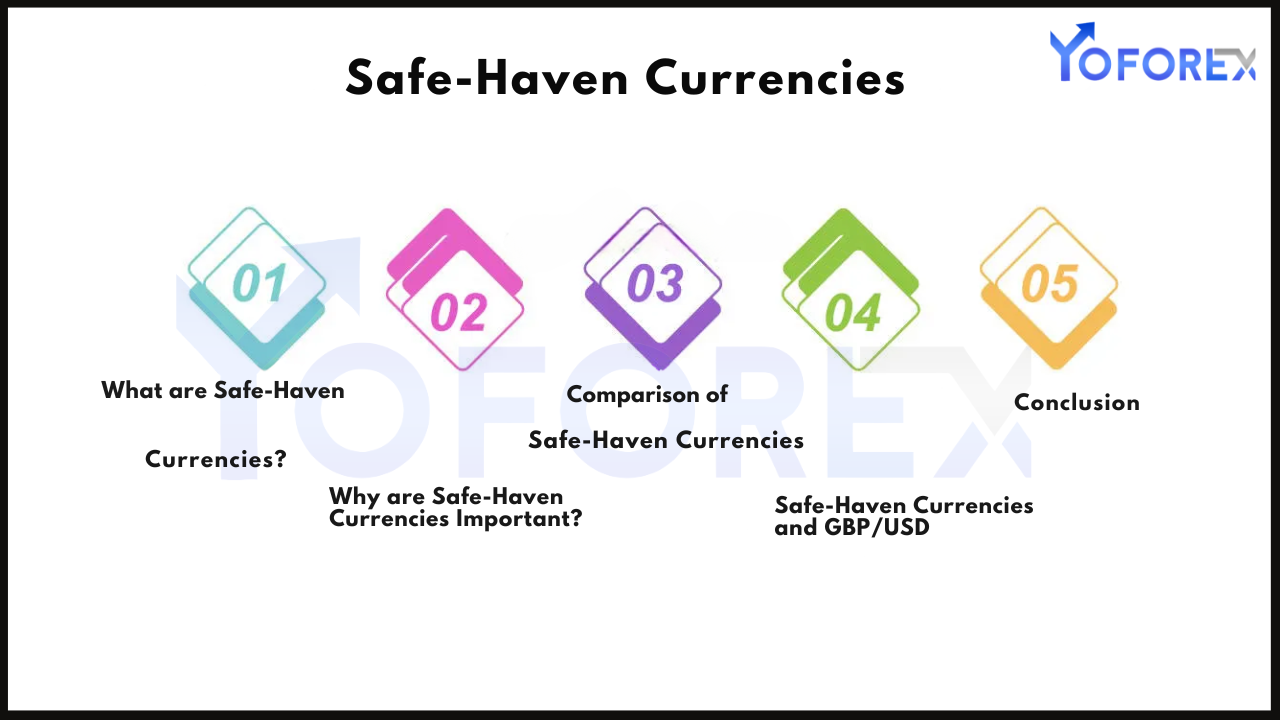During periods of economic uncertainty, financial markets often experience heightened volatility, and investors look for ways to preserve their capital. Safe-haven currencies play a crucial role in this context, providing a stable store of value and a refuge from market turmoil. Understanding the dynamics of safe-haven currencies can help forex traders and investors navigate uncertain times effectively.
This blog explores the concept of safe-haven currencies, their characteristics, examples, and how they influence the forex market during economic instability.
What Are Safe-Haven Currencies?
Safe-haven currencies are currencies that tend to maintain or increase their value during periods of economic uncertainty, geopolitical tensions, or financial market turmoil. These currencies are favored by investors seeking stability and protection against risk.

Characteristics of Safe-Haven Currencies:
- Economic Stability:
- Backed by economies with strong fundamentals, low inflation, and robust financial systems.
- Liquidity:
- Widely traded in the forex market, ensuring ease of buying and selling.
- Perceived Security:
- Viewed as reliable due to the issuing country’s political and economic strength.
- Low Volatility:
- Exhibit less price fluctuation compared to riskier currencies.
Examples of Safe-Haven Currencies
1. US Dollar (USD):
- The USD is the world’s primary reserve currency and a go-to safe haven during crises.
- Backed by the largest and most liquid economy in the world.
- Benefits from global demand for US Treasury bonds.
2. Swiss Franc (CHF):
- The Swiss Franc is considered a safe haven due to Switzerland’s political neutrality, strong economy, and stable banking system.
- Often appreciates during geopolitical tensions or market downturns.
3. Japanese Yen (JPY):
- The Yen is a preferred safe-haven due to Japan’s significant current account surplus and low interest rates.
- Investors flock to the Yen during global economic instability.
4. Gold-Backed Currencies:
- While not currencies in the traditional sense, gold and currencies linked to gold can act as safe-havens.
- Gold often sees increased demand during periods of uncertainty, influencing forex markets.
Why Do Investors Choose Safe-Haven Currencies?
1. Capital Preservation:
- Protects against losses when riskier assets decline in value.
2. Diversification:
- Adds stability to portfolios dominated by equities, commodities, or high-yield currencies.
3. Hedging Against Risk:
- Offers a hedge against geopolitical instability, economic downturns, or currency devaluations.
4. Global Confidence:
- Safe-haven currencies inspire confidence due to their issuing country’s economic and political stability.
Role of Safe-Haven Currencies During Economic Uncertainty
1. Flight to Safety:
- Investors shift funds from riskier assets like stocks, high-yield bonds, or emerging market currencies to safe-haven currencies.
- Example: During the 2008 Global Financial Crisis, the USD and JPY experienced significant appreciation as investors sought refuge.
2. Impact on Currency Values:
- Safe-haven currencies often appreciate during times of crisis, leading to sharp movements in forex markets.
- Example: The CHF strengthened during the Eurozone debt crisis as investors moved away from the Euro.
3. Central Bank Actions:
- Central banks in countries issuing safe-haven currencies may intervene to prevent excessive appreciation that could harm exports.
- Example: The Swiss National Bank (SNB) imposed a cap on the CHF/EUR exchange rate in 2011 to protect its economy.
4. Market Sentiment Indicator:
- The performance of safe-haven currencies often reflects global risk sentiment, providing insights into investor confidence.
How Forex Traders Can Benefit from Safe-Haven Currencies
1. Hedging Strategies:
- Use safe-haven currencies to hedge against market volatility or economic uncertainty.
- Example: Pair long positions in USD/JPY or USD/CHF with riskier assets to balance exposure.
2. Trading Volatility:
- Capitalize on price movements by trading safe-haven pairs during periods of high volatility.
- Example: Short risk-sensitive currencies like AUD or NZD against USD or JPY during market downturns.
3. Monitor Economic Events:
- Track events like geopolitical tensions, central bank decisions, or economic data releases that may influence safe-haven demand.
4. Diversification:
- Include safe-haven currencies in trading portfolios to reduce risk exposure and enhance stability.
Risks Associated with Safe-Haven Currencies
While safe-haven currencies offer stability, they are not without risks:
1. Central Bank Interventions:
- Excessive appreciation may prompt interventions to stabilize the currency.
2. Reduced Yield:
- Safe-haven currencies typically offer lower interest rates, reducing potential returns from carry trades.
3. Sudden Sentiment Shifts:
- Rapid changes in market sentiment can lead to abrupt reversals in safe-haven flows.
4. Overcrowded Trades:
- High demand for safe-haven currencies during crises can lead to overcrowded positions and increased volatility.
Practical Example: Trading Safe-Haven Currencies
Scenario:
- Event: A global economic downturn leads to stock market declines.
- Market Reaction:
- Investors move funds into USD, JPY, and CHF as safe-haven currencies.
- Trade Setup:
- Go long on USD/JPY and short on AUD/USD to capitalize on safe-haven demand.
- Outcome:
- As market uncertainty persists, safe-haven currencies strengthen, yielding profitable trades.
Tools for Trading Safe-Haven Currencies
- Economic Calendars:
- Monitor global economic data and central bank meetings.
- News Feeds:
- Stay updated on geopolitical developments and market sentiment.
- Technical Indicators:
- Use tools like RSI, MACD, and Bollinger Bands to identify entry and exit points.
- Correlation Analysis:
- Analyze correlations between safe-haven currencies and risk-sensitive assets to refine strategies.
Conclusion
Safe-haven currencies play a pivotal role during times of economic uncertainty, offering stability and protection against market volatility. For forex traders, understanding the dynamics of safe-haven currencies and their responses to global events is essential for navigating uncertain markets. By leveraging safe-haven currencies strategically, traders can hedge risks, capitalize on volatility, and achieve greater portfolio resilience. However, it’s important to remain vigilant about central bank interventions and sudden sentiment shifts to manage risks effectively.

